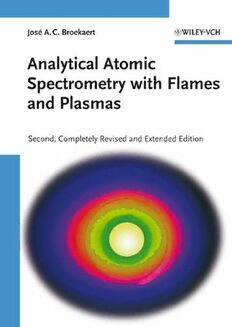
Analytical Atomic Spectrometry with Flames and Plasmas, Second Edition PDF
Preview Analytical Atomic Spectrometry with Flames and Plasmas, Second Edition
J.A.C.Broekaert AnalyticalAtomic SpectrometrywithFlames andPlasmas AnalyticalAtomicSpectrometrywithFlamesandPlasmas. Jose´A.C.Broekaert Copyright(2005WILEY-VCHVerlagGmbH&Co.KGaA,Weinheim ISBN:3-527-31282-X Jose´ A. C. Broekaert Analytical Atomic Spectrometry with Flames and Plasmas Second, Completely Revised and Extended Edition Prof.Dr.Jose´A.C.Broekaert 9 Thisbookwascarefullyproduced. Universita¨tHamburg Nevertheless,authorandpublisherdonot FachbereichChemie warranttheinformationcontainedtherein Institutfu¨rAnorganischeundAngewandte tobefreeoferrors.Readersareadvisedto Chemie keepinmindthatstatements,data, Martin-Luther-King-Platz6 illustrations,proceduraldetailsorother 20146Hamburg itemsmayinadvertentlybeinaccurate. Germany FirstEdition2002 Second,CompletelyRevisedandExtended Edition2005 LibraryofCongressCardNo.:Appliedfor BritishLibraryCataloguing-in-Publication Data:Acataloguerecordforthisbookis availablefromtheBritishLibrary. DeutscheBibliothekCataloguing-in- PublicationData: (2005WILEY-VCHVerlagGmbH&Co. KGaA,Weinheim(FederalRepublicof Germany) Allrightsreserved(includingthoseof translationinotherlanguages).Nopartof thisbookmaybereproducedinanyform– byphotoprinting,microfilm,oranyother means–nortransmittedortranslatedinto machinelanguagewithoutwritten permissionfromthepublishers.Registered names,trademarks,etc.usedinthisbook, evenwhennotspecificallymarkedassuch, arenottobeconsideredunprotectedbylaw. PrintedintheFederalRepublicof Germany. Printedonacid-freepaper. Composition: AscoTypesetters,HongKong Printing: betz-druckgmbh,Darmstadt Bookbinding: Litges&DopfBuchbinderei GmbH,Heppenheim CoverDesign: Schulz,Grafik-Design, Fußgo¨nheim ISBN-10: 3-527-31282-X ISBN-13: 978-3-527-31282-5 TomywifePaulaandourdaughtersIlse, SigridandCarmen VII Contents Preface XI Introduction 1 1 BasicPrinciples 4 1.1 Atomicstructure 4 1.2 Plasmas 8 1.3 Emissionandabsorptionofradiation 9 1.4 Ionization 18 1.5 Dissociation 23 1.6 Sourcesforatomicspectrometry 26 1.7 Analyticalatomicspectrometry 31 2 SpectrometricInstrumentation 34 2.1 Figuresofmeritofananalyticalmethod 34 2.2 Opticalspectrometers 51 2.2.1 Opticalsystems 52 2.2.2 Radiationdetectors 61 2.2.3 Miniaturizedspectrometers 70 2.2.4 Non-dispersivespectrometers 73 2.3 Massspectrometers 75 2.3.1 Typesofmassspectrometers 76 2.3.2 Iondetection 84 2.3.3 Ionextraction 87 2.3.4 Ionopticsandtransmission 88 2.4 Dataacquisitionandtreatment 89 2.5 Traceability 92 3 SampleIntroductionDevices 94 3.1 Sampleintroductionbypneumaticnebulization 96 3.2 Ultrasonicnebulization 113 3.3 Hydrideandothervolatilespeciesgeneration 114 3.4 Electrothermalvaporization 120 VIII Contents 3.4.1 Thevolatilizationprocess 121 3.4.2 Typesofelectrothermaldevices 122 3.4.3 Temperatureprogramming 125 3.4.4 Analyticalperformance 127 3.5 Directsolidssampling 128 3.5.1 Thermalmethods 128 3.5.2 Slurryatomization 131 3.5.3 Arcandsparkablation 136 3.5.4 Laserablation 142 3.6 Cathodicsputtering 147 4 AtomicAbsorptionSpectrometry 159 4.1 Principles 159 4.2 Atomicabsorptionspectrometers 161 4.2.1 Spectrometers 161 4.2.2 Primaryradiationsources 163 4.3 Flameatomicabsorption 171 4.3.1 Flamesandburners 172 4.3.2 Nebulizers 174 4.3.3 Figuresofmerit 175 4.4 Electrothermalatomicabsorption 177 4.4.1 Atomizers 178 4.4.2 Thermochemistry 181 4.4.3 Figuresofmerit 182 4.5 Specialtechniques 187 4.5.1 Hydrideandcold-vaportechniques 187 4.5.2 Directsolidssampling 189 4.5.3 Indirectdeterminations 190 4.5.4 Flowinjectionanalysis 190 4.5.5 Diodelaseratomicabsorptionspectrometry 191 4.6 Backgroundcorrectiontechniques 192 4.6.1 Correctionforbackgroundabsorptionwiththedeuteriumlamp technique 192 4.6.2 BackgroundcorrectionwiththeaidoftheZeemaneffect 194 4.6.3 TheSmith–Hieftjetechnique 197 4.6.4 Coherentforwardscattering 197 4.7 Fieldsofapplication 199 4.8 Outlook 205 5 OpticalEmissionSpectrometry 207 5.1 Principles 207 5.2 Atomicemissionspectrometers 217 5.3 Flameemission 225 5.4 Arcsandsparks 225 5.4.1 Arcemissionspectrometry 225 Contents IX 5.4.1.1 Arccharacteristics 225 5.4.1.2 DCarcspectrometry 226 5.4.1.3 ACarcspectrometry 228 5.4.2 Sparkemissionspectrometry 228 5.4.2.1 Sparks 228 5.4.2.2 Analyticalfeatures 230 5.5 PlasmasourceOES 232 5.5.1 DCplasma-jetOES 232 5.5.1.1 Typesofplasmajets 232 5.5.1.2 Three-electrodeplasmajet 233 5.5.2 InductivelycoupledplasmaOES 234 5.5.2.1 Theinductivelycoupledplasma 234 5.5.2.2 Instrumentation 236 5.5.2.3 Analyticalperformance 238 5.5.2.4 Applications 247 5.5.3 Low-powerhigh-frequencyplasmas 249 5.5.4 Microwaveplasmas 253 5.6 GlowdischargeOES 265 5.6.1 HollowcathodesforOES 266 5.6.2 Furnaceemissionspectrometry 267 5.6.3 DCglowdischargeswithaflatcathode 268 5.6.4 RFglowdischarges 272 5.6.5 Newdevelopments 273 5.7 Lasersources 279 6 PlasmaMassSpectrometry 284 6.1 ICPmassspectrometry 285 6.1.1 Instrumentation 285 6.1.2 Analyticalfeatures 287 6.1.3 Applications 304 6.1.4 Outlook 311 6.2 Glowdischargemassspectrometry 314 6.2.1 Instrumentation 316 6.2.2 Analyticalperformance 323 6.2.3 Analyticalapplications 323 7 AtomicFluorescenceSpectrometry 332 7.1 Principles 332 7.2 Instrumentation 335 7.3 Analyticalperformance 337 8 Laser-EnhancedIonizationSpectrometry 339 8.1 Principles 339 8.2 Figuesofmerit 342 8.3 Analyticalapplications 343 X Contents 9 SamplePreparationforAtomicSpectrometry 345 9.1 Samplepreparationindirectcompactsampleanalysis 345 9.2 Grinding,sieving,andcompactionofpowders 345 9.3 Sampledissolution 347 9.3.1 Wetchemicalmethods 347 9.3.2 Fusionprocedures 347 9.3.3 Microwave-assistedmethods 348 9.3.4 Combustiontechniques 348 9.4 Flowinjectionanalysis 348 9.5 Leachingsamplepreparationmethods 349 10 ComparisonwithOtherMethods 350 10.1 Powerofdetection 350 10.2 Analyticalaccuracy 352 10.3 Economicaspects 353 Literature 355 Index 402 XI Preface Spectrochemical analysis is a powerful instrumental principle for the determina- tionofthechemicalelementsandtheirspeciesinavarietyofsampletypesofdif- ferent size, at widely different concentration levels, and with very differing cost– performance ratios and time consumption. In addition, not only monoelement butalsomultielementdeterminationsarepossible,withwidelydifferingprecision andaccuracy,usingthevariousdifferentmethods.Thebasicprinciplesofspectro- chemical analysis are related to atomic and molecular structure and also to gas- discharge physics as well as to instrumentation and measurement sciences. Therefore,researchintospectrochemicalanalysisrequiresknowledgeoftheafore- mentioneddisciplinestoenableinnovativedevelopmentsofnewmethodologiesto be achieved in terms of the improvement of power of detection, accuracy, and cost–performance ratios, these being the driving forces in analytical innovation. The development of analytical procedures also requires the analytical chemist to have a knowledge of the theory and the principles of the above-mentioned disci- plines.Itistheaimofthismonographtobringtogetherthetheoryandprinciples of today’s spectrochemical methods that make use of flames and plasma sources. This should enable researchers to enter the field of spectrochemical research, whereinnovationisthroughtheuseanddevelopmentofnewsourcesandtheap- plicationofnewtypesofspectrometers,andalsotofacechallengesfromemerging fieldsofapplication,whichisasstraightforwardtodayasitwaseveninthetimeof Bunsen and Kirchhoff. This work should appeal both to chemists and physicists, the cooperation of whom is instrumental for progress to be made in this field of analytical chemistry, as well as to users from different areas of science, including the life sciences, material sciences, environmental sciences, geochemistry, chemi- cal processtechnology,etc. The presentwork could alsobe viewed as are´sume´ of the theoretical background, which manufacturers of instrumentation for atomic absorption spectrometry, arc, spark and glow discharge emission spectrometry, as well as ICP emission spectrometry and plasma mass spectrometry with ICPs or glow discharges and laser-based techniques can recommend to their interested userstomakethemostefficientuseoftheseanalyticalmethodsintheirrespective fieldsofapplication.Also,researchassociatesenteringthefieldofatomicspectros- copy with flames and plasmas should find the necessary basics and references to furtherliteratureinthisbook. XII Preface The work also describes a number of achievements of over thirty years of re- search performed at the University of Gent (Belgium), the Institute for Analytical Sciences–ISASDortmund,theUniversityofDortmund,theUniversityofLeipzig, andtheUniversityofHamburg,whichhavebeenmadepossiblethroughmanyin- teractionsandcollaborationswithexpertsinthefield,whomIthankthoroughly.A great deal of knowledge gained from my teachers and in interaction with promi- nentseniorresearchersinthefieldworldwideandespeciallyattheCouncilforSci- entific and Industrial Research and the University of Stellenbosch (South Africa), the Universitaire Instelling Antwerpen (UIA) (Belgium), and Indiana University, Bloomington (IN, USA), as well as results obtained while collaborating with col- leagues and with students, made this book possible, for which all of them are gratefullyacknowledgedandthanked. Hamburg,April2005 Jose´ A.C.Broekaert
